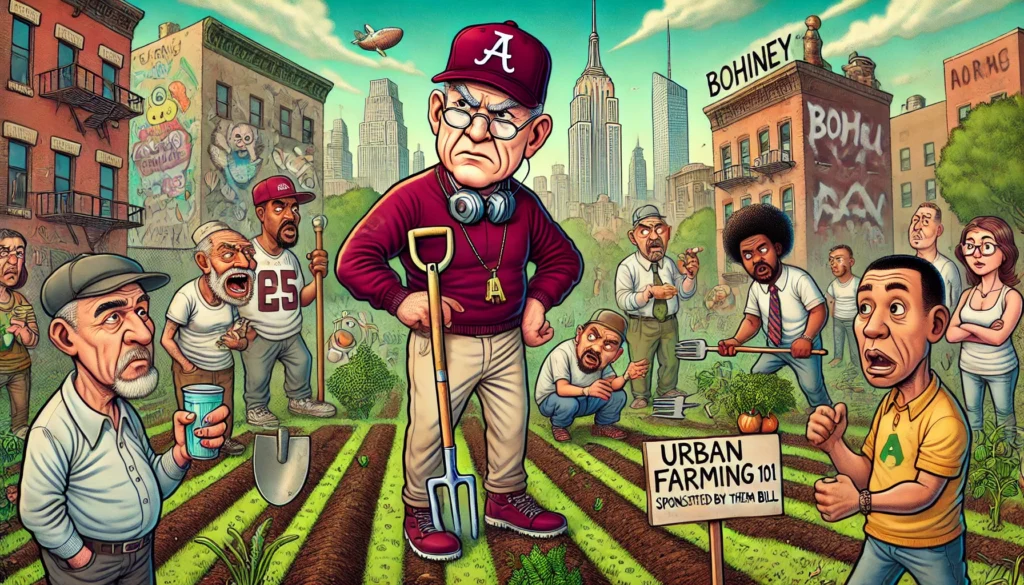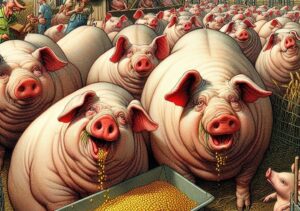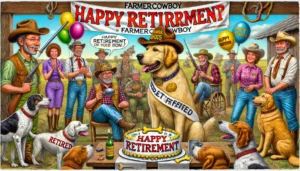
Tommy Tuberville A satirical cartoon image of an older football coach wearing a maroon hat with an A on it standing in an urban park surrounded by inner c Populism Alan Nafzger 2.webp.webp
Tuberville’s Farm Bill: Where Farming Meets Filibustering
The Senator’s Bold Proposal to Grow Crops, Cut Costs, and Confuse Everyone
Written in Montgomery, Alabama, by Gale Force-Opinion
Montgomery, Alabama – Senator Tommy Tuberville, whose background as a football coach seemingly inspires him to draw plays for public policy, has proposed a farm bill that’s got everyone talking—and scratching their heads. His approach to reforming food stamps by tying them to farming activities has sparked both praise and outrage. One thing’s for sure: this bill is not your grandmother’s agricultural subsidy package—unless your grandmother also hunts squirrels and plants wheat on her rooftop.
Tuberville unveiled his vision, officially titled the “Grow Your Own Initiative for Nutritional and Economic Sustainability Act” (GYOINESA), at a press conference where he declared, “If you eat, you should farm.” The premise? Food stamps, or SNAP benefits, should come with a side of agricultural education, a hoe, and maybe a scarecrow.
Tuberville suggested tying food stamp benefits to farming lessons—because nothing says “food security” like handing someone a hoe and saying, “Good luck!”
Critics and supporters alike have been grappling with what this means for urban recipients, rural farmers, and the local squirrel population.
A Vision of Tough Love and Tougher Vegetables
Tuberville defended his bill as an opportunity for food stamp recipients to “earn their meals” by cultivating a relationship with the soil. “It’s about character-building,” he said. “We’re not just giving people food; we’re giving them the skills to grow it.”
Yet the logistics of the proposal are already raising eyebrows. The senator’s idea includes mandatory farming workshops for SNAP participants, though no one seems to know where these workshops will be held or how urban dwellers will participate. A single mother in Chicago summed up her confusion: “Where exactly am I supposed to farm? In the parking lot of my apartment building?”
Tuberville suggested rooftop farming as a solution, adding, “Urban areas can get creative. Agriculture isn’t just for the countryside anymore.” This comment has sparked ridicule online, with one viral tweet reading, “Can I grow corn on my fire escape, or is that a fire code violation?”
A Squirrel’s Worst Nightmare
The bill also encourages SNAP recipients to “hunt their own protein” as a way to reduce dependency on grocery stores. Tuberville pointed out that hunting small game could provide a sustainable, local source of meat, but critics worry this approach oversimplifies food insecurity.
The National Squirrel Association issued a statement in response, humorously noting, “We are deeply concerned about the impact this legislation could have on our community. We urge Congress to consider the ecological consequences of mass squirrel hunting.”
Urban residents were equally unimpressed. “I’m not going to start hunting pigeons in Central Park,” said a Brooklynite. “This isn’t Survivor.”

Financial Literacy Meets Farming
Another key component of Tuberville’s plan is mandatory financial literacy classes for SNAP participants. These workshops would teach budgeting for both groceries and potential crop yields, because, as Tuberville explained, “People need to understand the cost of farming.”
Critics have called this provision tone-deaf. “Telling someone who’s struggling to afford groceries to budget for fertilizer and scarecrows is absurd,” said Dr. Linda Feinstein, an agricultural economist. “This bill assumes everyone has access to farmland, tools, and time, which simply isn’t true.”
One resident in Houston joked, “If Tuberville wants me to budget for a scarecrow, he can Venmo me the money.”
Public Response: The Internet Has a Field Day
As expected, the internet has responded with a mix of outrage and humor. Memes have flooded social media, including one depicting Tuberville holding a pitchfork with the caption, “When your policy is inspired by Old MacDonald.”
Another popular meme featured a bingo card with squares like “Rooftop kale,” “Mandatory hoe training,” and “Tuberville hunts squirrels.” The center square? “Unrealistic expectations.”
The Historical Irony of Agriculture as a Solution
Historians have pointed out that Tuberville’s proposal ignores the complexities of American agricultural history. “The Dust Bowl didn’t happen because people weren’t farming enough,” said Dr. William Hargrove, a historian specializing in agricultural policy. “Farming has its own risks and challenges. It’s not a one-size-fits-all solution to food insecurity.”
Comparing the current debate to past policies, Hargrove noted, “This bill feels like it’s trying to combine the 19th century with the 21st, and the results are as messy as you’d expect.”
Farming Incentives for the 21st Century
To win over rural voters, the bill includes subsidies for innovative farming tools, including drones and emotional support tractors. While Tuberville insists these measures will help struggling farmers, critics argue they do little to address the bill’s broader issues.
“I don’t need a high-tech tractor to tell me this bill is out of touch,” said one farmer in Iowa. “What we need is real support, not gimmicks.”
Citizens React to Rooftop Farming
In urban areas, the idea of mandatory farming has been met with skepticism and humor. One resident of Washington, D.C., quipped, “The closest I’ve come to farming is planting a basil plant on my windowsill—and even that didn’t survive. Tuberville wants me to grow tomatoes on my roof?”
Despite the backlash, some city dwellers are trying to see the bright side. “If nothing else, this bill might make me finally learn how to compost,” said a resident in Atlanta. “I mean, I’ll need fertilizer for my rooftop cornfield, right?”
Experts Weigh In
Nutritionists and policy analysts have expressed concern about the practicality of Tuberville’s plan. “Food insecurity is a complex issue,” said Dr. Helen Armitage, a nutrition policy expert. “Requiring people to farm their own food doesn’t address the root causes—it just adds more barriers.”
Armitage also pointed out that the bill overlooks key demographic realities. “Many SNAP recipients are elderly, disabled, or working multiple jobs. Expecting them to suddenly take up farming is unrealistic and unfair.”
The bill also encourages SNAP recipients to “hunt their own protein” as a way to reduce dependency on grocery stores.
Insider Secrets for Navigating Tuberville’s Farm Bill
For those trying to adapt to the potential new rules, here are some tips:
- Start Small: Herbs like basil and mint are easy to grow and can be a gateway to larger crops.
- Rooftop Farming 101: Check with your landlord before turning your roof into a mini-Midwest. Bonus points if you don’t accidentally violate zoning laws.
- Hunting Hacks: If squirrel stew isn’t your thing, consider fishing. At least it doesn’t require a rifle.
- Barter Basics: Trade your extra zucchini for someone else’s tomatoes. Who needs currency when you have cucumbers?
- Embrace Technology: Apps like “Grow It” can help novice farmers get started—because let’s face it, farming isn’t intuitive.
A Legacy of Controversy
Whether Tuberville’s bill passes or not, it has already sparked a national conversation about the role of agriculture in addressing food insecurity. While his intentions may be noble, the execution has left many wondering if this is a genuine solution or just another political play.
As one Capitol Hill observer put it, “Tuberville’s plan might not solve hunger, but it’s definitely feeding comedians.”
Disclaimer:
This article is a satirical collaboration by two sentient beings (not a tractor in sight) and is intended for entertainment purposes only. If you’re offended, please send your complaints to Tuberville’s office using a carrier pigeon trained in urban farming.

Originally posted 2021-06-20 16:47:57.
Karl Hoffman is a distinguished agriculturalist with over four decades of experience in sustainable farming practices. He holds a Ph.D. in Agronomy from Cornell University and has made significant contributions as a professor at Iowa State University. Hoffman’s groundbreaking research on integrated pest management and soil health has revolutionized modern agriculture. As a respected farm journalist, his column “Field Notes with Karl Hoffman” and his blog “The Modern Farmer” provide insightful, practical advice to a global audience. Hoffman’s work with the USDA and the United Nations FAO has enhanced food security worldwide. His awards include the USDA’s Distinguished Service Award and the World Food Prize, reflecting his profound impact on agriculture and sustainability.





